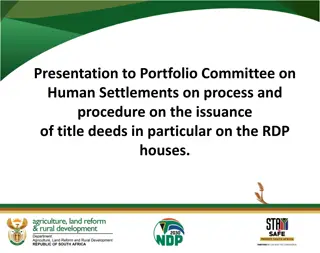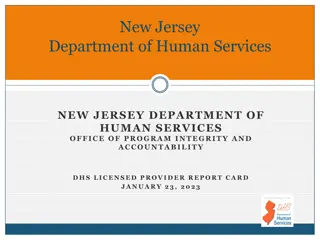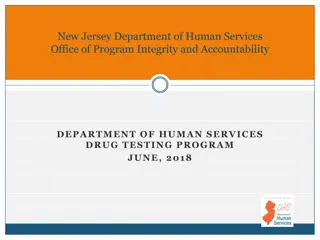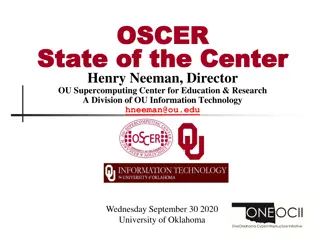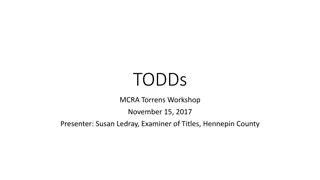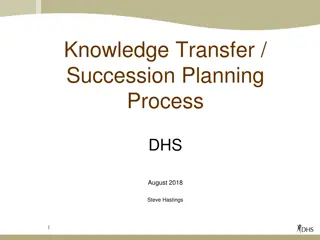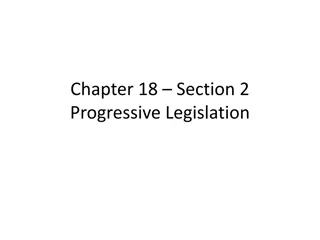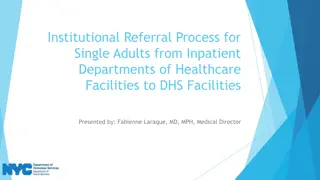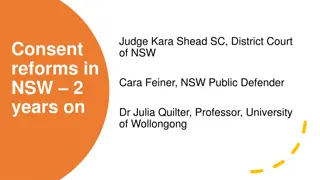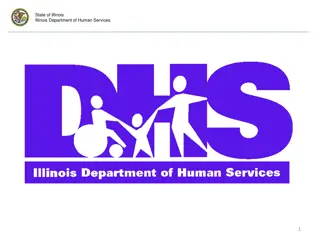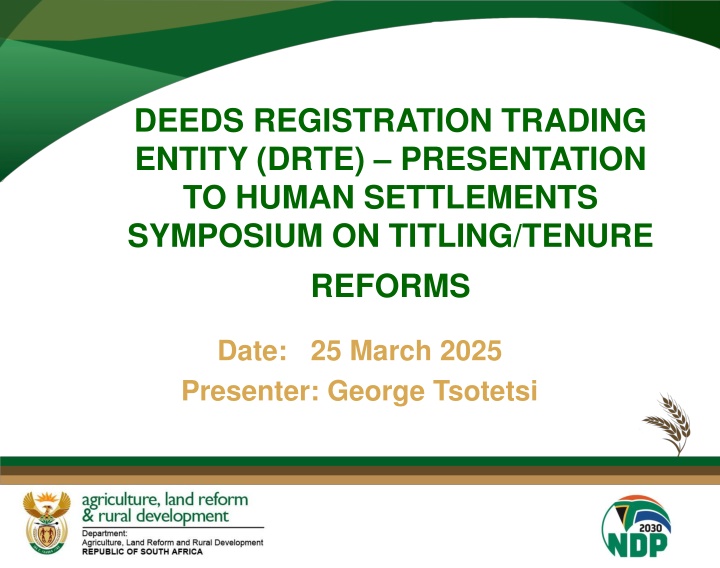
DRTE Presentation at Human Settlements Symposium on Titling/Tenure Reforms
"Learn about the Deeds Registration Trading Entity (DRTE) and its role in managing the country's deeds registration system. Explore the legislative framework, registrable tenure options, and the responsibilities involved in property registration. Discover the history, purpose, and organizational structure of the DRTE as presented at the symposium."
Download Presentation

Please find below an Image/Link to download the presentation.
The content on the website is provided AS IS for your information and personal use only. It may not be sold, licensed, or shared on other websites without obtaining consent from the author. If you encounter any issues during the download, it is possible that the publisher has removed the file from their server.
You are allowed to download the files provided on this website for personal or commercial use, subject to the condition that they are used lawfully. All files are the property of their respective owners.
The content on the website is provided AS IS for your information and personal use only. It may not be sold, licensed, or shared on other websites without obtaining consent from the author.
E N D
Presentation Transcript
DEEDS REGISTRATION TRADING ENTITY (DRTE) PRESENTATION TO HUMAN SETTLEMENTS SYMPOSIUM ON TITLING/TENURE REFORMS Date: 25 March 2025 Presenter: George Tsotetsi
PRESENTATION OUTLINE Background and the Purpose of the Deeds Registration Trading Entity (DRTE) The Organogram of the DRTE Legislative and Policy Framework Deeds registration concepts Registrable tenure options Recordal of rights Reasons for rejection Office fees Workflow in a deeds registry
PRESENTATION OUTLINE Physical existence of property vs legal existence Who is empowered to prepare deeds for registration The responsibility of the preparer The responsibility to register Township establishment Costs of registration
Background and the Purpose of the Deeds Registration Trading Entity The DRTE came into existence in 1984 as a result of the creation of the position of the Chief Registrar of Deeds by section 2(a) of Act 62 of 1984. The DRTE operates a Category 1 Trading Account which was approved by National Treasury in 1994.
Background and the Purpose of the Deeds Registration Trading Entity The purpose of the DRTE is to manage the Country s deeds registration system, administer the Deeds Registries Act (DRA), the Electronic Deeds Registration Systems Act (EDRSA) and the Sectional Titles Act (STA). The DRTE also advises the Minister regarding the amendment of the above Acts as well as handling litigation arising from the implementation of the abovementioned Acts.
The Organogram of the DRTE OFFICE OF CHIEF REGISTRAR OF DEEDS Chief Registrar of Deeds (CRD) Senior Financial Officer (SFO) Chief Director: Information Communication Technology (CD:ICT) Chief Director: Programme Management (Entity Development) (CD: PM) Registrar of Deeds Legal Support & Deeds Training (ROD: LS&DT) Registrars of Deeds ( Deeds Registries)
Chief Registrar of Deeds The CRD is the: Accounting Officer of the Category 1 Deeds Trading Account which account relates to monies collected for supply of information and registration of deeds (Section 7 read with regulation 84 of DRA) Head of the DRTE and supervisor of all Registrars of Deeds, the SFO, the CD: ICT and CD: Entity Development. Chairperson of the Regulations Board. Deeds Registries
SENIOR FINANCIAL OFFICER SFO is responsible for: Management of Human Resources Financial Management Supply Chain Management Facilities Management
CHIEF DIRECTOR: PROGRAM MANAGEMENT CD: PM performs the following functions: 1. Establish and maintain the programme governance model and project management. 2. Establish programme/project plans and schedules. 3. Manage service achievement of desired outcomes. 4. Manage the programme operations and resources. providers to ensure
CHIEF DIRECTOR: PROGRAM MANAGEMENT 5. Establish an effective and efficient results based programme management office 6. monitoring, measurement and reporting. Establish and maintain programme 7. Establish and maintain programme change management initiatives.
ROD: LEGAL SUPPORT & DEEDS TRAINING ROD: LS&DT is responsible for: Development and implementation of the DRA, EDRSA and STA. Drafting Chief Registrar s Circulars. Drafting of responses to Parliamentary Questions, General Public enquiries, Ministerial and Director General Tasks. Monitoring Legal Compliance in deeds registries. Contract vetting. Litigation Services. Deeds Training Services.
REGISTRAR OF DEEDS (Deeds Registries) ROD: is responsible for: Taking Charge and preserving all records of a deeds registry Registering deeds and documents. Recording all notices, returns, statements, or orders of court. Keeping deeds registration registers. Rectifying certain errors in registered deeds. Cancelling registered deeds upon order of Court. Supplying deeds registration information. Providing reports to Court.
Legislative and Policy Framework DRTE derives its legislative mandate from the DRA, STA and EDRSA. Section 1 of DRA empowers Minister to establish, define the areas of jurisdiction and to disestablish deeds registries.
Legislative and Policy Framework Section 2, Subject to the laws governing the public service, empowers Minister to appoint a Chief Registrar of Deeds (CRD), Registrars of Deeds, Deputy Registrars of Deeds and Assistant Registrars of Deeds. Section 7 provides for supply of information upon payment of fees prescribed by Reg 84. No one, including the State, is exempt from payment of these fees. Section 9 establishes the Deeds Registries Regulations Board (DRRB), chaired by the Chief Registrar of Deeds. The DRRB advises the Minister with regards to regulations and proposed amendments to DRA.
EDRSA Section 2 of EDRSA empowers the CRD to- Establish, develop, maintain an Electronic Deeds Registration System (EDRS), and issue directives for functional and technical specifications of EDRS. The EDRS will facilitate the electronic - preparation, lodgement, registration, execution and storing of deeds and documents. Section 6 of EDRSA provides for a transitional period in which manual registrations and electronic registration would take place concurrently.
EDRSA The DRTE will launch the Electronic Deeds Registration System (EDRS) on 1 April 2025. Over and above the functionalities prescribed in the registration information will also be obtainable using the EDRS. EDRSA, deeds
DEEDS REGISTRATION CONCEPTS LODGEMENT: Process of submitting deeds to a deeds registry. Examination: Process registrability or otherwise of deeds. Endorsement: Process endorsements on deeds. Numbering: Process of giving numbers to deeds for distinguishing between different deeds for retrieval purposes. of verifying of effecting
DEEDS REGISTRATION CONCEPTS Black booking: Process of verifying presents or otherwise of impediments to registration. Execution: Process of signing deeds to signify assent to registration. Data capturing: Process of updating deeds registry records regarding newly registered deeds. The above processes electronically when performed in the Electronic Deeds Registration System. will be done
REGISTRABLE TENURE OPTIONS Freehold commonly known as full ownership which is transferable from one person to another by means of a deed of transfer Sec 16 DRA. Leasehold granted in terms of Act 4 of 1984 transferable by means of deed of transfer Sec 16A DRA.
REGISTRABLE TENURE OPTIONS Leasehold granted in terms of Proclamation 293 of 1962 transferable by means of deed of endorsement of existing deed of grant unless a township register has opened, in which case transferrable by means of deed of transfer. Lease can be prepared by a Government official if granted by the Government Sec 3(1)(c) DRA, otherwise it must be prepared by a Notary Public section 77 of the DRA.
RECORDAL OF RIGHTS Land tenure rights lawfully issued by Government or any other competent authority in compliance with requirements of any law will be recordable in a deeds registry section 3(1)(c)bis of DRA. Currently there is no law that provides for lawful issue of tenure rights.
REASONS FOR REJECTION In terms of section 3(1)(b) of DRA, deeds are rejected for non-conformity with the provision of the DRA or with the provisions of any other law or if there is a valid objection to registration.
OFFICE FEES Office fees are prescribed by Regulation 84 of DRA. The Deeds Registries Regulations Board proposes fees that must be endorsed by National Treasury before approval by the Minister. These fees are published in the Government Gazette annually and are effective from the beginning of each financial year.
OFFICE FEES These fees relate to the supply of information and acts of registrations relating to transfer of property, registration of certificates of title, registration and cancelation of mortgage bonds, issuing of copies of deeds for information purposes, issuing of certified copies of deeds to replace lost titles, keeping of a client s copy of a deed.
OFFICE FEES 4. (a) For a copy of a deed or document obtained through any other electronic system or issued by a registrar in terms of regulations 66, 67, and 70 103.00 per copy (b) For the application and the issuing of a certified copy of a deed in terms of regulation 68(1)624.00 per copy (c)For the keeping of a client s copy of a deed, on approval and at discretion of the registrar 492,00 per copy per year or part thereof 5. (a) (b) For an enquiry relating to a person, property or deed For a deeds office tracking system enquiry 18,00 18,00
WORKFLOW IN A DEEDS REGISTRY Day 3 Day 2 Day 2 Day 3 Day 1 Lodge- - ment Counter Lodge ment Counter Lodgement Data Prep Distribution (1st level) Junior Examination (2nd level) Senior Examination Distribution Distribution Day 12 Days 10 & 11 Micro: Deeds are Scanned & verified Day 5 Rejected Deeds are Delivered back to the Client Day 4 Rejected Deeds Deeds are Delivered back to the Client Delivery Counter Monitor (3rd level) Day 5( PREP ) Conveyancers Attend to notes & Finalise Finances Deeds are Final Black-Booked Deeds are sorted Day 6 Day 7 & 8 Day 9 Passed Deeds Deeds are Executed Deeds are Numbered, Dated &Embossed Final Checking Data Capturing Data Verification
Physical existence of property vs legal existence Mere physical existence of property does not mean that it also legally exists. Property legally exists only when it has been surveyed and registered (Section 14 of the Land Survey Act 9 of 1997).
Who is empowered to prepare deeds for registration Deeds of transfer, mortgage bonds and certificates of title can only be prepared by conveyancers, unless provided otherwise in any other law. (Section 15 DRA). Section 13(3)(b) of Act 112 of 1991 provides for the preparation of deeds of transfer by an Authorised Officer.
THE RESPONSIBILITY OF THE PREPARER The preparer of a deed accepts responsibility, to the extent prescribed by regulation 44A of DRA for the accuracy of those facts mentioned in such deed Section 15A of DRA. The facts referred to above include, amongst other things, the identity and signature of the grantor of a power of attorney, the authority of an agent and the marital status of parties to a deed.
THE RESPONSIBILITY TO REGISTER The responsibility to register registrable acts of registration rests with the registered owner of the affected property. The registered owner executes the responsibility to register by signing the relevant power of attorney. In the case of a lease, both the lessee and the lessor execute a lease before the Notary Public.
Township establishment Township establishment is a matter that rests with the Premier and the Townships Board of the relevant Province in cases where a township was established in terms of old order legislation. Where the Spatial Planning and Land Use Management Act (SPLUMA) is applicable, township establishment is a matter of the relevant Municipality and the Municipal Planning Tribunal Sections 33 and 41 SPLUMA.
Township establishment From a deeds registration perspective, a township exists only upon the opening a township register in terms of section 46 of DRA. Erven in a township, as separate pieces of land, exists only when they have been transferred by the township owner.
Costs of registration Fees of offices, on a sliding scale in relation to the purchase price or the value of the property or the capital amount of a mortgage bond, as prescribed by regulation 84 of the DRA. Conveyancing costs, in accordance with the guidelines published by the Law Society of South Africa and effective from 27 May 2024 or as negotiated by the https://www.lssa.org.za. parties concerned



